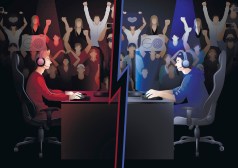Video-based training is helping to transform teacher performance in Denver

Video coaching is hardly new. In the sports world, it’s been around for ages.
But in the education sector, the University of Colorado Denver and the Denver Public Schools have adopted a new teacher training model, enhanced in part by a classroom observation platform that lets users share comments and collaborate to improve the practices of beginning teachers.
The program, called NxtGen Teacher Residency, is a partnership between CU Denver and the Denver Public Schools (DPS) that recruits, prepares and supports the next generation of DPS teachers through an intensive, four-year undergraduate program—the first of its kind in the U.S., according to Dr. Cindy Gutierrez, director of office partnerships for the School of Education and Human Development at CU Denver.
“It prepares students to become teachers in a very clinically rich model, with lots of experience in the field,” she told EdScoop. “They begin working immediately with teachers and supporting school district priorities, culminating in a senior student-teacher residency for a full year in a Denver Public Schools classroom.”
In their first three years as undergraduates, students are hired as part-time para-professional interns by DPS, where they gain plenty of classroom experience. After graduation, they receive priority hiring preference and continue to get support through the program for two years.
“It’s an accelerated path to teacher leadership as well because they’re so well prepared on the front lines,” Gutierrez said.
Part of the technology support throughout the program involves Edthena, an online platform that lets students, mentors and other stakeholders upload videos of teachers in action and then share observations and comments about classroom performance.
“It’s not that video recording your teaching is anything new but what Edthena offers is a very user-friendly way to share and engage with that video in a way that’s never been possible before,” Gutierrez said. “Everybody has a smart phone or mobile device where you can quickly capture video, upload it to the platform and share it with other people in the community who can help teachers get better.”
Read EdScoop’s Q & A with Denver Public Schools tech chief Josh Allen.
Users can watch a classroom video, stop it at a certain point, tag it and pose a question, make a comment or share related resources with other users.
“It enables you not only to tag the videos but have a dialogue right there on the platform,” she said. “It’s a powerfully robust and easy-to-use platform that allows you to help teachers get better faster through the use of video.”
Edthena developers have recently incorporated a new tool into the platform called Comment Stats, which generates reports, graphs and charts that organize and display comments by their type and by any professional framework tags. Guiterrez said that the tool has the potential to further support teacher development by “understanding where the trends are and targeting better what you do.”
Using Comment Stats, teachers can look across all comments and reflect on multiple videos at once to see trends in the types of comments they’ve received, said Adam Geller, founder and CEO of Edthena.
Gutierrez said the biggest hurdle to video-based teacher training is the “fear factor”—getting over anxiety about being on video and having information and feedback about their performance shared among a large group of people.
“Everybody hates seeing themselves on video,” she said. “You’ve got to give teachers the space to get over that. You have to make it safe, trusting and give them time to get comfortable with the fact that you’re always going to be turning on a video camera in the classroom.”
Aside from any individual qualms about the system, however, video-based training is making teacher development in the Denver Public Schools more generative, more collaborative and more inquiry oriented, according to Gutierrez.
“I think we’re on the verge of transforming the way we as teacher educators give feedback,” she said.




